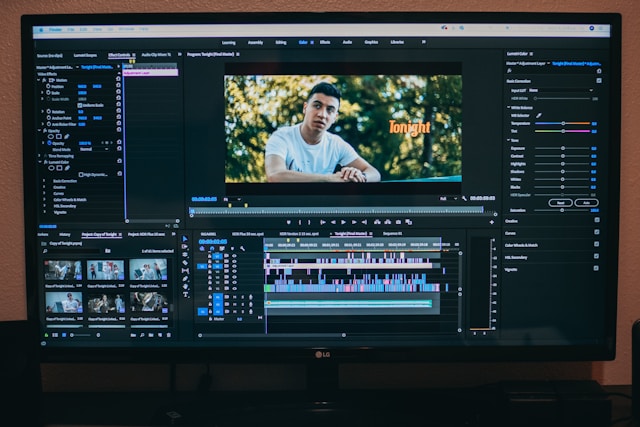In today’s digital age, the demand for skilled video editors is skyrocketing. With the rise of online content creation, businesses, influencers, and individuals are constantly seeking high-quality video material to engage their audience. If you have a passion for storytelling, a keen eye for detail, and enjoy working from the comfort of your own home, becoming a home-based video editor might just be the perfect career path for you.
1. Understanding the Role of a Home-Based Video Editor
Before diving into the world of home-based video editing, it’s essential to understand the responsibilities that come with the role. As a video editor, your primary task is to transform raw footage into polished, cohesive videos that captivate and engage viewers. This involves mastering various editing software, honing your creative skills, and understanding the principles of visual storytelling. However, being a home-based video editor goes beyond just technical proficiency. You also need to possess excellent communication skills to understand the vision of your clients and effectively collaborate with them to bring their ideas to life. Additionally, problem-solving abilities are crucial as you navigate challenges such as tight deadlines, client revisions, and technical issues that may arise during the editing process. Embracing a proactive and adaptable mindset is key to overcoming obstacles and delivering results that exceed client expectations.
Furthermore, staying abreast of industry trends and advancements is vital for remaining competitive as a home-based video editor. The landscape of video editing is constantly evolving, with new technologies, techniques, and styles emerging regularly. Dedicate time to exploring new software features, experimenting with innovative editing techniques, and studying successful projects in your niche. By staying curious and continuously learning, you can stay ahead of the curve and offer cutting-edge solutions to your clients. Additionally, consider seeking feedback from peers, mentors, or industry professionals to gain insights into areas for improvement and opportunities for growth. Embracing a mindset of lifelong learning ensures that you remain relevant and adaptable in an ever-changing industry.
2. Essential Skills and Qualifications
While formal education in video editing can be beneficial, it’s not always a requirement to break into the field. Many successful home-based video editors are self-taught, relying on online tutorials, workshops, and hands-on experience to develop their skills. However, possessing a strong foundation in video editing software such as Adobe Premiere Pro, Final Cut Pro, or DaVinci Resolve can give you a competitive edge in the industry. Additionally, proficiency in other related skills such as color grading, motion graphics, and sound design can further enhance your capabilities as a video editor, allowing you to deliver high-quality productions that stand out in the competitive market. Continuously honing these skills through practice and experimentation is key to staying relevant and meeting the evolving demands of clients and audiences alike.
3. Building Your Portfolio
One of the most crucial steps in establishing yourself as a home-based video editor is building a robust portfolio that showcases your talent and expertise. Start by creating your own projects or collaborating with friends, family, or local businesses to gain practical experience. As you progress, continually update your portfolio with your best work to demonstrate your growth and versatility to potential clients. Moreover, consider diversifying your portfolio by showcasing a variety of video editing styles, genres, and formats. This not only highlights your adaptability as a video editor but also increases your appeal to a wider range of clients with diverse needs and preferences. Additionally, soliciting feedback from peers, mentors, or clients can provide valuable insights for improving your work and refining your portfolio presentation.
4. Finding Clients and Networking Opportunities
Securing clients as a home-based video editor requires proactive networking and marketing efforts. Utilize online platforms such as LinkedIn, Upwork, or Fiverr to showcase your services and connect with potential clients. Additionally, attending industry events, joining online communities, and reaching out to fellow professionals can help expand your network and uncover new opportunities. Furthermore, don’t underestimate the power of word-of-mouth marketing. Encourage satisfied clients to refer you to their contacts and consider offering incentives for referrals. Building strong relationships with clients not only increases the likelihood of repeat business but also opens doors to new opportunities through their networks.
In addition to online platforms and industry events, consider leveraging social media to showcase your work and engage with potential clients. Create a professional presence on platforms like Instagram, Facebook, and Twitter, where you can share samples of your work, behind-the-scenes insights, and industry-related content. Engage with your audience by responding to comments, participating in relevant discussions, and networking with other professionals in your field. Social media provides a powerful platform to build your brand, establish credibility, and attract clients who resonate with your style and expertise.
5. Time Management and Work-Life Balance
Working from home as a video editor offers flexibility and freedom, but it also requires discipline and effective time management skills. Establishing a daily routine, setting clear boundaries between work and personal life, and prioritizing tasks are essential for maintaining a healthy work-life balance. Additionally, investing in ergonomic workspace setup and taking regular breaks can prevent burnout and enhance productivity. However, it’s important to recognize that managing time effectively goes beyond simply scheduling tasks. Embracing productivity techniques such as the Pomodoro Technique, time blocking, or task batching can help you optimize your workflow and make the most of your working hours. Experiment with different methods to find what works best for you and be willing to adjust your approach as needed to maximize your efficiency and effectiveness.
Moreover, maintaining a healthy work-life balance also involves nurturing your mental and physical well-being. Incorporate regular exercise, mindfulness practices, and hobbies into your routine to recharge and rejuvenate outside of work hours. Prioritize self-care and make time for activities that bring you joy and fulfillment. Remember that a well-rested and fulfilled video editor is better equipped to produce high-quality work and sustain long-term success in their career. By prioritizing both work and personal well-being, you can achieve a harmonious balance that allows you to thrive professionally and personally.
6. Continuous Learning and Professional Development
The field of video editing is constantly evolving, with new technologies and trends emerging regularly. To stay competitive in the industry, commit to lifelong learning and professional development. Take advantage of online courses, workshops, and industry conferences to expand your skill set, stay updated on the latest software updates, and explore new creative techniques.
Conclusion
Becoming a successful home-based video editor is an exciting journey filled with opportunities for creativity, growth, and fulfillment. By mastering essential skills, building a strong portfolio, and cultivating a reliable network, you can turn your passion for video editing into a rewarding career from the comfort of your own home.
Are you ready to embark on your journey as a home-based video editor? Share your thoughts and experiences in the comments below, and don’t forget to visit Home Business Expo for more tips and resources to support your home-based business endeavors.
Find a Home-Based Business to Start-Up >>> Hundreds of Business Listings.


















































